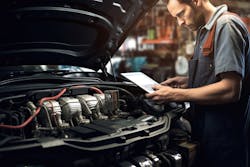Back in '81, when computers invaded mass-produced vehicles, replacing carburetors with fuel injection, did anyone imagine the diagnostic charges would become a hot topic? Fast forward, and here we are, still grappling with the evolution of check engine lights and the debate over whether to charge for diagnostic services.
This debate is complex and often revolves around varying perspectives. Some customers expect diagnostic checks to be complimentary, while technicians argue that charging appropriately is essential to cover their expertise and the sophisticated tools required for the job. Striking the right balance becomes a challenge.
Check engine lights are not equal
Not all check engine lights are equal, and acknowledging this is crucial. A diagnostic process for a high-end vehicle may require extensive expertise and time, unlike a routine check. Implementing different diagnostic levels based on the complexity of the issue is a fair practice. It ensures that customers pay for the service they receive, promoting transparency and fairness.
Let’s say a Cadillac comes in with a check engine light and it takes five hours for your tech to diagnose the problem. You would charge five hours to the customer. But, if three weeks later a similar Cadillac comes in with the same check engine code, be sure to give it to the same tech. From previous experience, it’s likely that tech will complete the diagnosis in a fraction of the time he did before. In this case, you would charge lesser amount.
Download ATI’s 3-Level Diagnosis Chart to end the ongoing debate about how much to charge for your check engine diagnostic. Grab your chart here: https://bit.ly/3utXvyo
Expertise comes at a price
The automotive repair industry is unique in that the more skilled a technician becomes, the less they are compensated. Recognizing the value of their accumulated knowledge is essential for fostering a supportive and fair working environment.
Understanding the value of accumulation of knowledge is vital. Just as education is highly valued and scales with significant compensation, so should the expertise of automotive technicians. Charging for diagnostics is not about exploiting customers but recognizing the value of the accumulated knowledge and skills required for the job.
To attract and retain the best techs, it's imperative to create a supportive and profitable environment. Rethinking the notion of free diagnostics for highly skilled technicians is a step in the right direction. Ensuring fair compensation is crucial for the sustainability of the industry and the quality of service provided.



